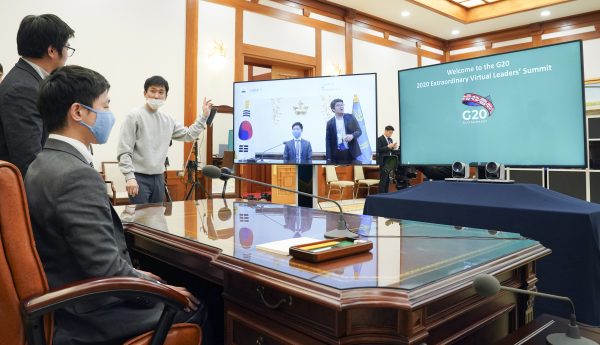In 2020, under Saudi leadership and amid ongoing US–China and US–Europe trade tensions, the G20 has been slow to respond to the COVID-19 pandemic. Surging demand for medical supplies triggered some governments to impose export bans on products such as gloves, gowns and face masks as well as some agricultural products. Airports have closed to foreign visitors, dealing a further blow to trade. And import protection and investment barriers continue apace among advanced countries, led by the United States.
The recent G20 statement, pledging to ‘keep our markets open’, is so heavily conditioned that members can continue restrictive policies already introduced, plus those they might implement going forward ‘consistent with the needs of citizens’. The leaders agreed to ‘avoid unnecessary interference with international traffic and trade’. But whether they could impose new restrictions deemed necessary for their own purposes was left unsaid. Such measures would be ‘targeted, proportionate, transparent and temporary’.
Fine words but no real commitment. Instead, the G20 condones the exploitation of loopholes to avoid World Trade Organization (WTO) obligations.
There was no promise to lift export restrictions on medical products. Many G20 members are limiting or banning exports of medical and agricultural products. The US Federal Emergency Management Agency has now blocked exports of personal protective equipment without a special licence. These restrictions endanger people in poor countries that have no access to medical supplies and may provoke other countries to emulate and retaliate against the US action.
G20 members only promise to ‘work to ensure’ the flow of medical supplies and essential goods and services, and to ‘work to resolve’ supply chain disruptions. By contrast, a group of liberal countries led by New Zealand and Singapore agreed to refrain from imposing export bans.
What should the G20 do?
For starters, the countries should revive the pledge they made in 2008 facing another, albeit lesser, global crisis — ‘within the next 12 months, we will refrain from raising new barriers to investment or to trade in goods and services, imposing new export restrictions, or implementing WTO inconsistent measures’.
But that commitment needs further elaboration to avoid measures that fudge the non-interventionist pledge.
The G20 should agree not to invoke new export restrictions on food and other products — even if authorised under WTO rules — and to discontinue existing bans within 90 days. Russia and a few developing countries recently imposed new export restrictions on rice and other grains. This action was driven by the shortage of food supplies as local demand surged. But restrictions of this nature can result in much higher food prices worldwide. One study found that export restrictions caused the international rice price to hike by 45 per cent, and the international wheat price by 30 per cent, during the 2006–08 crisis.
It should also lower or remove tariffs and non-tariff measures on medical products and other essential supplies. Liberalisation could lower the cost of inputs like active ingredients and scarce chemicals, boosting domestic production of complex medicines. It would also expedite delivery of imports from foreign suppliers to local consumers. In fact, US tariffs on imports from China threaten to create medical shortages and disrupt supply chains. Argentina should be commended for suspending anti-dumping duties on imports of Chinese and Brazilian medical products. What is needed is a G20 zero-for-zero tariff deal on medical supplies.
Renouncing new ‘buy national’ rules and waiving existing restrictions on purchasing medical products and other essential supplies is also important. Both domestic production and imports can serve to meet rising domestic demand. Countries should commit to keep supply chains open to facilitate imports of raw materials, inputs and final goods in the medical category. Many countries import large volumes of medical products from overseas, particularly China. Local purchase requirements will only worsen the shortage of medical supplies.
The G20 should adopt an ‘open platform’ policy on patenting and licensing COVID-19 tests and treatments. To fight the pandemic, these should be readily available for vulnerable populations around the world. The gravity of the COVID-19 crisis needs to be balanced against exclusive patents arising from pharmaceutical research and development. Some G20 countries are already planning to issue ‘compulsory licenses’ that allow the use of COVID-19 technology without the patent holder’s consent. Advanced G20 members should support large-scale production facilities in various regions to ensure adequate supply and effective distribution of medicines and therapeutic tests as they are approved.
It could also commission the WTO and OECD to monitor implementation of G20 commitments and report quarterly to the WTO General Council. During the global financial crisis, the G20 accepted joint reports from multilateral organisations and asked them to monitor progress, reporting on a quarterly basis. In the current crisis, the monitoring mechanism could encourage national implementation of commitments and recommend additional actions to mitigate COVID-19.
Implementing new protocols for foreign travel subject to international testing guidelines would allow businesspersons and tourists who test free of the virus prior to their departure and upon their arrival to travel abroad. Travel bans — currently imposed by several G20 members — cannot last forever. When the spread of disease is contained, the international movement of people should again be permitted, with appropriate insurance.
As new protectionist measures continue to proliferate and COVID-19 sends ripples through the global economy, such global cooperation and real commitments from the G20 are now vital.
Jeffrey J Schott is a senior fellow at the Peterson Institute of International Economics (PIIE).
Gary Clyde Hufbauer is a non-resident senior fellow at PIIE.
Euijin Jung is a research fellow at PIIE.
This article is part of an EAF special feature series on the novel coronavirus crisis and its impact.

